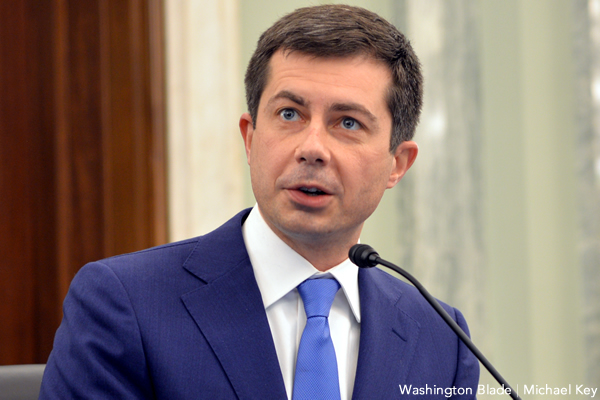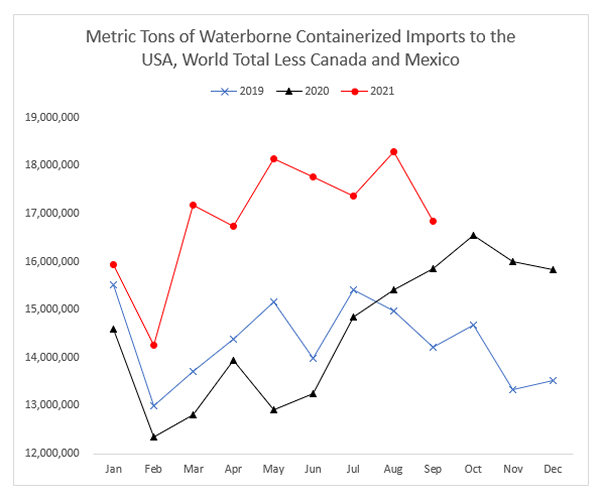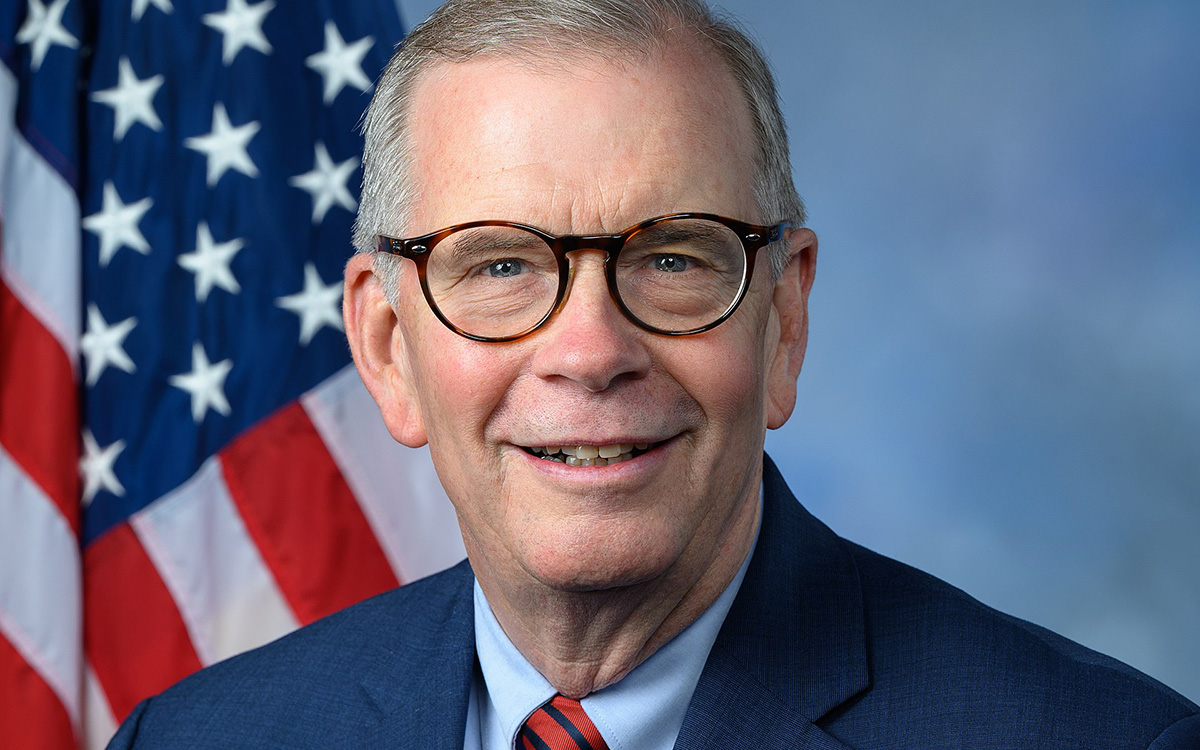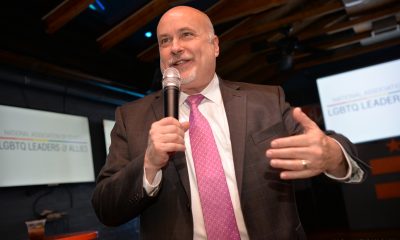Politics
Business experts split on criticism of Buttigieg on supply chain issues

Amid images of goods stranded on ships near America’s ports and notable price increases in basic commodities, including food and gasoline, right-wing critics are lambasting Pete Buttigieg in his role overseeing the supply chain as transportation secretary, although business experts in the field are split over whether that criticism is valid.
Business experts who spoke to the Blade — and whose own views may be colored by their political affiliations — offered a range of explanations for the break down in the supply chain, such as a sharp increase in demand among American consumers, the coronavirus pandemic, and a shortage of truck drivers responsible for transporting goods, which led to different conclusions as to whether Buttigieg, the first openly gay person confirmed by the U.S. Senate for a Cabinet position, was responsible.
Daniel Innis, a professor at the University of New Hampshire Peter T. College College of Business and Economics and who specializes in marketing and logistics and is a board member of Log Cabin Republicans, said criticism of Buttigieg is “certainly warranted” because he isn’t showing leadership in bringing stakeholders to the table.
“Pete can help by sitting down with the trucking industry, the railroads and so on and saying, ‘Look, this is a crisis that we have to solve,'” Innis said. “Eventually, you know, we’re going to get to a place where things that are really important aren’t available to us, and this has to be fixed. So you know, we need some leadership coming from Mayor Pete.”
As a result of supply chain issues, consumers are seeing increased prices for goods, including basic necessities like food and gasoline. With the Thanksgiving holiday fast approaching, experts say prices for turkey could be the most expensive in history for American consumers.
Innis, who said the supply chain depends on flow and “if any part of the chain breaks down, the whole thing collapses,” said the problem he’s hearing is on the receiving end at terminal hubs where truck drivers are supposed to pick up goods.
As an example, Innis offered a personal anecdote about being in Savannah, Ga, and seeing about 20 ships on the coastline waiting to come into the port. Such a port, Innis said, would be a first stop for goods before they’re loaded on trains and headed to terminal hubs, where truck drivers then pick it up.
“That’s where it’s breaking down,” Innis said. “Things are not getting picked up. And maybe a month or so ago, the Union Pacific Railroad basically barred anything coming out of LA for a week, so they could clear out the stuff from the Chicago terminal that wasn’t being picked up. So it seems to me based on my observation that we’ve got a real problem with truck drivers at the final destinations, and they’re not able to pick things up. So it backs up the entire system, and it’s backed up now all the way to the ocean.”
Specific things Buttigieg should be addressing with the trucking industry, Innis said, are why there is an such an acute truck driver shortage and what could be done to address it, including whether or not to change hours of service limiting the number of work hours truckers can drive each day, at least in the short term.
Other ideas Innis brought up, amid a national discussion about making community college free, was whether or not to make truck driver training free or giving 0 percent loans for the cost of school. Additionally, Innis said regulations prohibiting truckers under age 21 from driving across state lines should be scrapped.
“If you can drive from Miami to Jacksonville, which is eight hours, shouldn’t you be able to drive from Jacksonville to Charleston, which is four?” Innis said. “So you see, these are the things that he needs to be talking with the industry about, and maybe taking steps to address. And with just those little things, even if you pick up 10 or 15 percent of capacity, you have really moved things forward, maybe enough to start to gradually bring down the backlog.”
But defenders of the Biden administration say the supply chain breakdowns are complications of the increased demand, not any mismanagement at the top.
Jason Miller, associate professor of supply chain management at the Michigan State University Eli Broad College of Business, echoed the sense the blame for supply chain issues should be placed on increased demand and not Buttigieg.
“The disruptions the import supply chain is experiencing are due to record demand for imports due to record consumer spending on durable goods,” Miller said. “As such, there is nothing Secretary Buttigieg could truly do in such a scenario.”
Indeed, as Miller pointed out, waterborne containerized imports by weight through the first nine months of 2021 are up 17 percent from the first nine months of 2019, according to data from the Census Bureau obtained from USA Trade Online.
“This is why I like to characterize the import supply chain as strained due to record demand, as opposed to broken,” Miller concluded.

Innis, however, said ascribing supply chain issues to the simple increase in demand for goods — while valid in some respects — was over-simplifying matters, pointing out supply chain issues include goods produced and distributed domestically.
“Meat is not being imported from China,” Innis said. “It’s not sitting on a container, nor is bread, nor paper products nor all of these things that aren’t showing up in our stores. My nephew works at Whole Foods. He says they’re getting half shipments from companies. That is not sitting out on the ocean. And so, I’m not buying it across every category.”
Lisa Anderson, a supply chain expert and blogger with the Claremont, Calif.-based LMA Consulting Group, said Buttigieg has fallen short in his role as transportation secretary amid the supply crisis, concluding with respect to objections over his performance: “Unfortunately, the criticism is warranted.”
Among the tasks Buttigieg should take on, Anderson said, are touring the ports, talking to truck drivers and owner operators to understand the constraints from the front lines, coordinating with groups such as the Inland Empire Economic Partnership, the center of the logistics supply chain and conduit from Asia to the rest of the United States and finding ways to bridge government interests with business interests for the common good.
“It is a complex issue and will require strong leadership, involvement, collaboration, innovation and new thinking (breaking the traditional thinking) to resolve,” Anderson concluded.
Right-wing critics have seized on the supply chain issues and turned them into an indictment of the transportation secretary, who with his spouse Chasten Buttigieg, is a new parent, electing to stay on paternity leave for two months as the crisis unfolded.
Fox News’s Tucker Carlson, in a segment last month calling Buttigieg missing in action over the supply chain crisis, speculated Buttigieg may have taken off work “learning how to breast feed,” which defenders of Buttigieg denounced as a homophobic attack (although the snide comment could easily be made of a man in an opposite-sex relationship opting to go on paternity leave). Later, Carlson in a subsequent segment posited affirmative action is only the reason Buttigieg has the role of transportation secretary, implying the position was given to the former South Bend mayor and presidential candidate simply because he’s gay.
Innis, distancing himself from other critics in right-wing media despite his conservative political affiliations, said he was “not going to criticize” Buttigieg’s decision to go on paternity leave, which he called “something that is a part of life.”
The coronavirus pandemic, which disrupted livelihoods and economies from top to bottom across the globe, has also been identified as a factor in complications with the global supply chain, regardless of the administration in power.
Mahour Parast, a professor at Arizona State University’s School of Sustainable Engineering and the Built Environment who specializes in supply chain risk and resilience management, said “external shocks” can be in play with such systems and pointed to coronavirus as an example of such a disruption.
“A supply chain that is designed to be efficient (e.g. cost-effective) cannot be simultaneously resilient to disruptions,” Parast said. “This means that when disruptions such as COVID happen, the supply chain has difficulty to be responsive (because the entire system is designed to be efficient and to minimize cost). To be efficient, redundancy should be eliminated because redundancy adds cost to the system. To be resilient, redundancy is needed because it increases a system’s responsiveness.”
As an example of an eliminated redudancy that could end up being needed in a supply chain crisis, Parast pointed to the decision to move operations overseas to benefit from lower production cost or access to raw materials, which he said leads to cost savings at the expense of responsiveness and agility.
“One can make supply chains more resilient by regionalizing supply chain operations in which case there are several locations to back up each other in case of disruptions,” Parast said.
The Biden administration, for its part, has declared steps it would take to ease supply chain issues, mostly consistent with the dispersement of U.S. government money as a short-term solution. On Tuesday, the White House announced funding for a pop-up container yard project underway at the Port of Savannah, a $420 million grant program for ports and marine highways launched within the next 45 days and identifying coastal and waterway projects by the U.S. Army Corps of Engineers construction.
The White House announcement comes days after President Biden signed into law the bipartisan infrastructure package after months of negotiations among lawmakers, which he was set on Wednesday to promote at an event at the Port of Baltimore.
In his defense, Buttigieg has said in media appearances that supply chain issues aren’t the result of mismanagement, but prosperity and suppliers not being able to keep up under Biden administration policies seeking to lift the country up from economic stagnation.
Buttigieg, appearing on a CNN segment last month with Jake Tapper to respond to criticism about supply chain issues, said the problem exists because “retail sales are through the roof.”
“If you think about those images of ships, for example, waiting at anchor on the West Coast, you know, every one of those ships is full of record amounts of goods that Americans are buying because demand is up, because income is up, because the president has successfully guided this economy out of the teeth of a terrifying recession,” Buttigieg said. “Now the issue is, even though our ports are handling more than they ever have, record amounts of goods coming through, our supply chains can’t keep up.”
In June, the Biden administration set up a supply chain disruptions task force, which is led by the secretaries of commerce, transportation, and agriculture and charged with focusing on areas where a mismatch between supply and demand has been evident: homebuilding and construction, semi-conductors, transportation and agriculture and food.
A Department of Transportation spokesperson, asked by the Washington Blade to comment for this article, said Buttigieg in his role as co-chair of the Task Force “is focused on ensuring that the Department is doing all it can to address these issues and has made progress along the way.”
Among other examples, the spokesperson pointed to the Ports of Los Angeles and Long Beach announcing they would expand hours of operation; new support for paid apprenticeship programs in the truck driving industry; and Union Pacific railroad announcing it would go to 24/7 operations.
Innis, at the end of the day, rejected the idea Buttigieg’s hands were tied, saying despite increased demand causing blockages in the supply chain “there are steps that can be taken to ease it, and those are not being taken.”
“When you drill down into certain product categories, there are severe problems that aren’t being addressed that have nothing to do with the oceans, or even the trains,” Innis said. “Because your bread isn’t riding on a train. It’s on a truck coming from a local area. And these shortages are real. You walk through the grocery store, you see it.”
Congress
Goodlander endorses Pappas’s Senate bid
Announcement puts gay congressman on the path to securing his party’s nomination

U.S. Rep. Maggie Goodlander (D-N.H.) on Thursday announced she will not run to represent her state in the U.S. Senate, endorsing gay U.S. Rep. Chris Pappas’s (D-N.H.) bid for the seat of retiring U.S. Sen. Jeanne Shaheen, putting him on the path to secure the Democratic nomination.
“We are in the fight of our lifetimes right now, of a moment of real crisis and challenge,” she said. “I feel humbled and grateful to so many people across our state who have encouraged me to take a look at the U.S. Senate, and after a lot of thought and conversations with people I love and people I respect and people who I had never met before, who I work for in this role right now, I’ve decided that I’m running for re election in the House of Representatives.”
When asked by a reporter from the ABC affiliate station in New Hampshire whether she would endorse Pappas, Goodlander said, “Yes. Chris Pappas has been amazing partner to me in this work and for many years. And I really admire him. I have a lot of confidence in him.”
She continued, “He and I come to this work, I think with a similar set of values, we also have really similar family stories. Our families both came to New Hampshire over 100 years ago from the very same part of northern Greece. And the values that he brings to this work are ones that that I really, really admire. So I’m proud to support him, and I’m really excited to be working with him right now because we’ve got a lot of work to do.”
Today in Salem @MaggieG603 tells @WMUR9 she is not running for U.S. Senate & endorses @ChrisPappasNH #NHPolitics #NHSen #NH02 #WMUR pic.twitter.com/W2CMrhRuIC
— Adam Sexton (@AdamSextonWMUR) April 17, 2025
“Maggie Goodlander has dedicated her career to service, and we can always count on her to stand up to powerful interests and put people first,” Pappas said in a post on X. “I’m so grateful to call her my friend and teammate, and I’m proud to support her re-election and stand with her in the fights ahead.”
Earlier this month, former New Hampshire Gov. Chris Sununu, a Republican, announced he would not enter the Senate race, strengthening the odds that Democrats will retain control of Shaheen’s seat.
Congress
EXCLUSIVE: Garcia demands answers on deportation of gay Venezuelan asylum seeker
Congressman’s correspondence was shared exclusively with the Blade

U.S. Rep. Robert Garcia (D-Calif.) is demanding answers from the Trump-Vance administration on its deportation of Andry Hernández Romero, a gay Venezuelan makeup artist who was sent to a prison in El Salvador in violation of a federal court order and in the absence of credible evidence supporting the government’s claims about his affiliation with a criminal gang.
Copies of letters the congressman issued on Thursday to Immigration and Customs Enforcement and CoreCivic, a private prison contractor, were shared exclusively with the Washington Blade.
Garcia noted that Hernández, who sought asylum from persecution in Venezuela over his sexual orientation and political beliefs, had entered the U.S. legally, passed a preliminary screening, and had no criminal record.
Pro-bono lawyers representing Hernández during his detention in the U.S. pending an outcome in his asylum case were informed that their client had been removed to El Salvador a week after he failed to show for a hearing on March 13.
Hernández’s family now fears for his safety while he remains in El Salvador’s Terrorism Confinement Center (CECOT), which has a well documented record of human rights abuses, Garcia said.
Additionally, the congressman wrote, while experts say Tren de Aragua does not use tattoos as identifiers, the “primary evidence” supporting Hernández’s deportation based on his supposed links to the transnational Venezuelan gang “appears to have been two crown tattoos labeled ‘Mom’ and ‘Dad,’ which are common cultural symbols in his hometown.”
The determination about his links to or membership in the organization was made by a CoreCivic employee whose criminal record and misconduct as a law enforcement officer led to his termination from the Milwaukee Police Department, Garcia wrote in his letter to the company.
Requesting a response by May 1, the congressman asked CoreCivic President Damon T. Hininger to address the following questions:
- What qualifications and training does CoreCivic require for employees tasked with making determinations about detainees’ affiliations?
- What protocols are in place to ensure that determinations of gang affiliation are based on credible and corroborated evidence?
- How does CoreCivic oversee and review the decisions made by its employees in such critical matters?
- What mechanisms exist to prevent and address potential misconduct?
- What is the nature of CoreCivic’s collaboration with ICE in making determinations that affect deportation decisions? Are there joint review processes?
- What background checks and ongoing assessments are conducted for employees involved in detainee evaluations, particularly those with prior law enforcement experience?
- What guidelines does CoreCivic follow regarding the use of tattoos as indicators of gang affiliation, and how does the company ensure that cultural or personal tattoos are not misinterpreted?
In his letter to Tae D. Johnson, acting director of ICE, Garcia requested answers to the following questions by May 1:
- Did ICE personnel independently review and approve the determination made by CoreCivic employee Charles Cross Jr. identifying Mr. Hernández Romero as a member of the Tren de Aragua gang?
- What evidence, beyond Mr. Hernández Romero’s tattoos, was used to substantiate the claim of gang affiliation?
- Under what legal authority are private contractors like CoreCivic permitted to make determinations that directly impact deportation decisions?
- What vetting processes and background checks are in place for contractors involved in such determinations? Are there oversight mechanisms to ensure their credibility and adherence to due process?
- What guidelines does ICE follow regarding the use of tattoos as indicators of gang affiliation, and how does the company ensure that cultural or personal tattoos are not misinterpreted?
Together with U.S. Rep. Maxwell Frost (D-Fla.), Garcia wrote to U.S. Rep. James Comer (R-Ky.) on Tuesday requesting permission to bring a congressional delegation to CECOT for purposes of conducting a welfare check on detainees, expressing specific concern for Hernández’s wellbeing. The congressmen said they would “gladly include any Republican Members of the committee who wish to participate.”
Hernández’s case has drawn fierce criticism of the Trump-Vance administration along with calls for his return to the U.S.
Influential podcaster and Trump ally Joe Rogan spoke out in late March, calling the deportation “horrific” and “a horrible mistake.”
Last week, California Gov. Gavin Newsom (D) sent a letter to Kristi Noem, secretary of the U.S. Homeland Security, which manages ICE, demanding Hernández’s immediate return and raising concerns with the right to due process amid the administration’s crackdown on illegal immigration.
Hernández “was denied the opportunity to defend himself against unsubstantiated allegations of gang involvement or to present his asylum claim,” the governor wrote. “We are not a nation that sends people to be tortured and victimized in a foreign prison for public relations victories.”
Immigrant Defenders Law Center President Lindsay Toczylowski, who is representing Hernández, has not been able to reach her client since his removal from the U.S., she told NBC News San Diego in a report published April 11.
“Under the Constitution, every single person has a right to due process, and that means they have a right to notification of any allegations the government is making against them and a right to go into court and prove that those allegations are wrong if that’s the case,” she said. “In Andry’s case, the government never gave us that opportunity. In fact, they didn’t even bring him to court, and they have forcefully sent him to El Salvador without ever giving us any notice or without telling us the way that we could appeal their decision.”
“CECOT, this prison where no one has ever left, where people are held incommunicado, is a very dangerous place for someone like Andry,” Toczylowski said.
In March, a DHS spokesperson posted on X that Hernández’s “own social media indicates he is a member of Tren de Aragua,” though they did not point to any specific posts and NBC reported that reviews of his known social media accounts turned up no evidence of gang activity.
During a visit to CECOT in March, Time Magazine photographer Philip Holsinger photographed Romero and reported that the detainee plead his innocence — “I’m not a gang member. I’m gay. I’m a stylist.” — crying for his mother as he was slapped and his head was shaved.
Congress
House Republicans advance two anti-trans education bills
Congresswoman Jahana Hayes, LGBTQ groups slammed the effort

Republicans members of the House Education and Workforce Committee advanced two anti-transgender bills on Wednesday, one that would forcibly out students in public elementary and middle schools to their parents and a second covering grades K-12 that critics have dubbed a “don’t say trans” bill.
More specifically, under the PROTECT Kids Act, changes to “a minor’s gender markers, pronouns, or preferred name on any school form or sex-based accommodations, including locker rooms or bathrooms” could not be made without parental consent, while the Say No to Indoctrination Act would prohibit schools from teaching or advancing “gender ideology” as defined by President Donald Trump’s anti-trans Jan. 20 executive order, Defending Women from Gender Ideology Extremism and Restoring Biological Truth to the Federal Government.
U.S. Rep. Jahana Hayes (D-Conn.), who was named national teacher of the year before her election to Congress, rose to speak out against the bills during the committee’s convening on Wednesday.
“Curriculum does not include teaching students to be something else. Curriculum does not include indoctrinating students to identify as gay or LGBTQ or other or anything. But federal law mandates that all students have civil rights protections,” she said.
The congresswoman continued, “I don’t really understand what the members of this committee think happens in schools, but my question is, what do we do with these children? The children who you are saying, on this committee, don’t exist, the children who are struggling with their identity and often times confide in their teachers and ask for support and help.”
“What we’re doing in this committee is focusing on a small population of students who are at a point in their life where they are struggling and school may, for many of them, feel like the only safe place or the only place where they can get support, or the only place where they can speak to a counselor,” Hayes said.
“And as a teacher, I don’t care if it was just one student that I had to reassure that they were important and they were valued and they belonged here,” she said. “I’m going to do it, and anyone who has dedicated their life to this profession will do the same. So the idea that you all feel okay with arbitrarily erasing, disappearing people, making them think that they they don’t exist, or they don’t have a place in schools, or the curriculum should not include them, or whatever they’re feeling should not be valued, considered, Incorporated, is just wrong.”
“So I will not be supporting this piece of legislation, as if that was not already evident, and I will be using all of my time, my agency, my energy, my advocacy, to ensure that every student,” Hayes said, “feels valued, respected, important and included in the work that I engage in on this committee.”
The congresswoman concluded, “when you are in a classroom and you are a teacher, and that door closes and a student falls in your arms and says to you, I am struggling, and I can’t go home with this information, and I need Help, you have a moral responsibility to help that child or you are in the wrong profession. I yield back.”
The Congressional Equality Caucus slammed the bills in an emailed statement from the chair, U.S. Rep. Mark Takano (D-Calif.), who noted that the legislation comes as “Donald Trump is illegally trying to dismantle the Department of Education and pass tax cuts for billionaires.”
“Extreme Republicans in Congress are trying to distract Americans by advancing cruel, anti-trans legislation,” said the congressman, who is gay. “School districts, teachers, and staff best understand how to draft age-appropriate, inclusive curriculums and craft policies that both respect the important role parents play in children’s education and the importance of students’ safety.”
“Yet, Republicans’ Don’t Say Trans Act would cut critical funding for schools if their teachers teach lessons or include materials that simply acknowledge the reality of trans peoples’ existence,” Takano added. “Republicans’ forced outing bill would put kids in danger by requiring schools that want to take certain steps to affirm a transgender student’s identity to forcibly out them to their parents — even if the school knows this will put the student’s safety at risk.”
The caucus also slammed the bills in a series of posts on X.
🚨BAD BILLS ALERT🚨
— Congressional Equality Caucus (@EqualityCaucus) April 9, 2025
Today, the GOP-controlled Education Committee is voting on two anti-trans bills: One to force teachers to out trans students if they want to take certain steps to affirm the students’ identities, and a “Don’t Say Trans” bill.
Here's why we’re opposed: 🧵
The Human Rights Campaign also issued a statement on Wednesday by the organization’s communications director, Laurel Powell:
“Instead of putting our dangerous President in check and tackling the American economy’s free fall, House Republicans showed where their priorities lie — giving airtime to junk science and trying to pass more anti-LGBTQ+ legislation.
“Forcing teachers to ‘out’ trans youth rather than supporting them in coming out to their families and demanding that schools ignore the trans students who sit in their classrooms is a craven attempt to distract people from economic disaster by vilifying children.
“Even as they fire people whose jobs were to make sure schools have the resources they need, the Trump administration and their allies in Congress continue to attack vulnerable young people to score points with the far right.”
-

 State Department4 days ago
State Department4 days agoHIV/AIDS activists protest at State Department, demand full PEPFAR funding restoration
-

 Brazil4 days ago
Brazil4 days agoUS lists transgender Brazilian congresswoman’s gender as ‘male’ on visa
-

 District of Columbia4 days ago
District of Columbia4 days agoCapital Pride wins $900,000 D.C. grant to support WorldPride
-

 Mexico3 days ago
Mexico3 days agoGay couple claims Puerto Vallarta wedding venue discriminated against them












